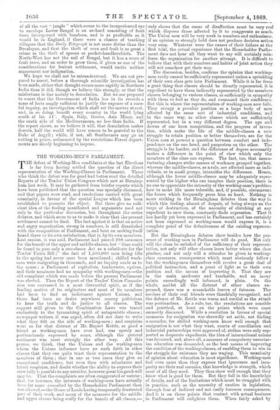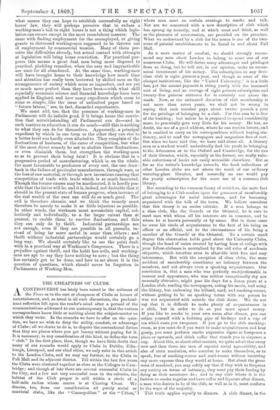THE WORKING-MEN'S PARLIAMENT.
THE defeat of Working-Men candidates at the last Elections is far from having settled the question of the direct
representation of the Working-Classes in Parliament. Those who think the defeat was for good had better read the detailed Reports of the Trades' Union Congress which met at Birming- ham last week. It may be gathered from briefer reports which have been published that the question was specially discussed, and that papers were read, and resolutions carried with great unanimity, in favour of the special League which has been established to promote the object. But these give no suffi- cient idea of the feeling manifested and arguments used not only in the particular discussion, but throughout the entire debates, and which seem to us to make it clear that Lite present settlement cannot be final. The fact against it is that an active and angry organization, strong in numbers, is still dissatisfied with the composition of Parliament, and bent on making itself heard there to its own satisfaction, that is, by its own members. Last session, it was said, Parliament had passed 288 measures for the benefit of the upper and middle-classes, but "time could be found to pass only a one-clause Act as a substitute for the Trades' Union Bill ;" the fact of 1,500,000 men being idle in the spring had never once been mentioned ; skilled work- men were emigrating in thousands, and no inquiry made as to the cause ; a Parliament of capitalists, landowners, squires, and their nominees had no sympathy with working-men—the old complaint which was made before the present Parliament was elected. Then the Report of the Trades' Union Commis- sion was canvassed in a most distrustful spirit, as if the leading motive of its originators and most of its members had been to find an indictment against Unions, and there had been no desire anywhere among politicians to hear the truth and do justice to all classes. The support still given to the Combination Laws was traced exclusively to the tyrannizing spirit of antagonistic Glasses ; newspaper writers, it was urged, often did not dare to write what they felt on the side of working-men ; and suspicion went so far that distrust of Mr. Rupert Kettle, as good a friend as working-men have ever had, was openly and pertinaciously expressed by some, although the general sentiment was most strongly the other way. All this proves, we think, that the Unions and the working-men whom the Unions influence have no such faith in other classes that they can quite trust their representation to the members of them ; that in one or two cases they give an exceptional confidence, but even then with reluctance and latent suspicion, and doubt whether the ability to express their view fully is possible to any outsider, however great his good-will may be. That the complaints are often exaggerated or untrue ; that, for instance, the interests of working-men have actually been far more consulted by the Householder Parliament than was allowed,—the House of Lords having temporarily frustrated part of their work, and many of the measures for the middle and upper classes being really for the benefit of all classes,— only shows that the cause of disaffection must be very real which disposes those affected by it to exaggerate so much. The Union men will be very weak in numbers and enthusiasm, if an opinion so strongly held does not produce decisive action very soon. Whatever were the causes of their failure at the first trial, the actual experience that the Householder Parlia- ment does not hear all they want to say will certainly rein- force the organization for another attempt. It is difficult to believe that with their numbers and habits of joint action they will not somehow get their way.
The discussion, besides, confirms the opinion that working- men really cannot be sufficiently represented unless a sprinkling of their own class gets into Parliament. While it is far from a good thing that classes should be directly represented, it is expedient to have them indirectly represented by the members chosen belonging to various classes, or sufficiently in sympathy with them to feel as they do, and command their confidence. But this is where the representation of working-men now fails.
They occupy a peculiar position as a large body of men affected by the same sort of industrial conditions, and in the same way, as other classes which are sufficiently represented, but in a very different degree. The ups and downs of our keen competition, and the progress of inven- tion, which make the life of the middle-classes a sore struggle to retain position or better themselves, are for the Union men at present a question between comfort and inde- pendence on the one hand, and pauperism on the other. The struggle is far harder, and the difference of degree necessarily makes a difference in the point of view which only the members of the class can express. The fact, too, that manu- facturing changes strike masses of workmen grouped together, whereas the middle-classes, as a rule, are affected more as indi- viduals, or in small groups, intensifies the difference. Hence, although the lower middle-classes may be adequately repre- sented by the higher who can imagine their position, there is no one to appreciate the intensity of the working-man's problem how to make life more tolerable, and, if possible, circumvent the forces which frequently press him so hard. Nothing is more striking in the Birmingham debates than the way in which this feeling, almost of despair, of being always on the verge of destruction, of the necessity of clutching at any expedient to save them, constantly finds expression. That it has hardly yet been expressed in Parliament, and has certainly not been expressed as working-men would express it, is a complete proof of the defectiveness of the existing represen- tation.
But the Birmingham debates show besides how the pre- sence of working men in Parliament will do good. Not only will the class be satisfied of the sufficiency of their represen- tation, not only will other classes learn better where the shoe pinches, and not only will a stimulus be given to working- class measures, consequences which must obviously follow ; but the working-men themselves will receive a great deal of political instruction, and a great of light as to their own position and the means of improving it. That they are in the main moderate and teachable, and on many points exceedingly well informed, is plain. On the whole, amidst all the distrust of other classes ex- pressed, there was a remarkable leaven of fairness. The services of their real friends were thankfully recognized, and the defence of Mr. Kettle was warm and cordial as the attack was pertinacious. As a rule, too, the resolutions are sensible and practical, at least on the points which were most earnestly discussed. While a resolution in favour of special measures for emigration was shrewdly set aside, not finding a seconder, for skilled working-men know well enough that emigration is not what they want, courts of conciliation and industrial partnerships were approved of, strikes were only sup- ported as desperate expedients, the idea of international unions was favoured, and, above all, a measure of compulsory unsectar- ian education was demanded, as the best means of improving the condition of the working-classes, of enabling them to win in the struggle for existence they are waging. This unanimity of opinion about education is most significant. Working-men feel even more than they express that ignorance and inca- pacity are their real enemies, that knowledge is strength, which most of all they need. They thus show well enough that they know what is good for them. But they fail in the knowledge of details, and of the limitations which must be struggled with in practice, such as the necessity of caution in legislation, through fear of indirect and not easily foreseen consequences. And it is on these points that contact with actual business in Parliament will enlighten them. When fairly asked by what means they can hope to establish successfully an eight hours' law, they will perhaps perceive that to reduce a working-man's toil to eight hours is not a thing which legis- lation can secure except in the most roundabout manner. The same with finding employment for the unemployed, or giving grants to distressed working-men supposed to be thrown out of employment by commercial treaties. Many of them per- ceive the difficulties already, but actual contact with attempts at legislation will bring home conviction. For practical pur- poses this means a great deal, men being more disposed to practical, plodding remedies, when the easy and impracticable are once for all abandoned. At the same time, working-men will have brought home to their knowledge how much time and attention has really been bestowed by skilled men on the arrangements of society which seem so imperfect, and are yet so much more perfect than they have been—with what skill especially economic science and financial knowledge have been applied in England, and how many expedients which seem to some so simple, like the issue of unlimited paper based on "future labour," are, in fact, discarded experiments. We must add, too, that the presence of working-men in Parliament will do infinite good, if it brings home the convic- tion that notwithstanding all Parliament can do—and in such matters as education it can do much—still this is nothing to what they can do for themselves. Apparently, a principal expedient by which in one form or the other they can rise to a better level was hardly even alluded to. They complain of the fluctuations of business, of the curse of competition, but what if the most direct remedy be not to abolish these fluctuations, or even diminish them, but strengthen the working-man so as to prevent their being fatal ? It is obvious that in a progressive period of manufacturing, which is, on the whole, the most favourable to producers of every sort, the one draw- back is the failure of paelicular manufactures, through wars, or the loss of raw material, or through new inventions causing that competition of trade with trade which is so much lamented. Though the former causes may be ameliorated, it is hardly pos- sible that the latter will be, and it is, indeed, not desirable that it should in the present state of human progress, when increase of the real wealth of the race can still do so much good. The evil is therefore chronic, and we think the remedy must therefore be merely to make it as little injurious as possible. In other words, the workmen must accumulate capital, col- lectively and individually, to a far larger extent than at present, to enable them to survive fluctuations, and this they can only do by thrift. Industrial partnerships are not enough, even if they are possible in all pursuits, in- stead of being far more useful in some than others ; and thrift without industrial partnerships would certainly go a long way. We should certainly like to see the point dealt with in a practical way at Workmen's Congresses. There is a prejudice against thrift, and the habit has evils, and working- mne are apt to say they have nothing to save ; but the thing has certainly got to' be done, and how to set about it is the question of questions, which should never be forgotten in Parliaments of Working-Men.































 Previous page
Previous page